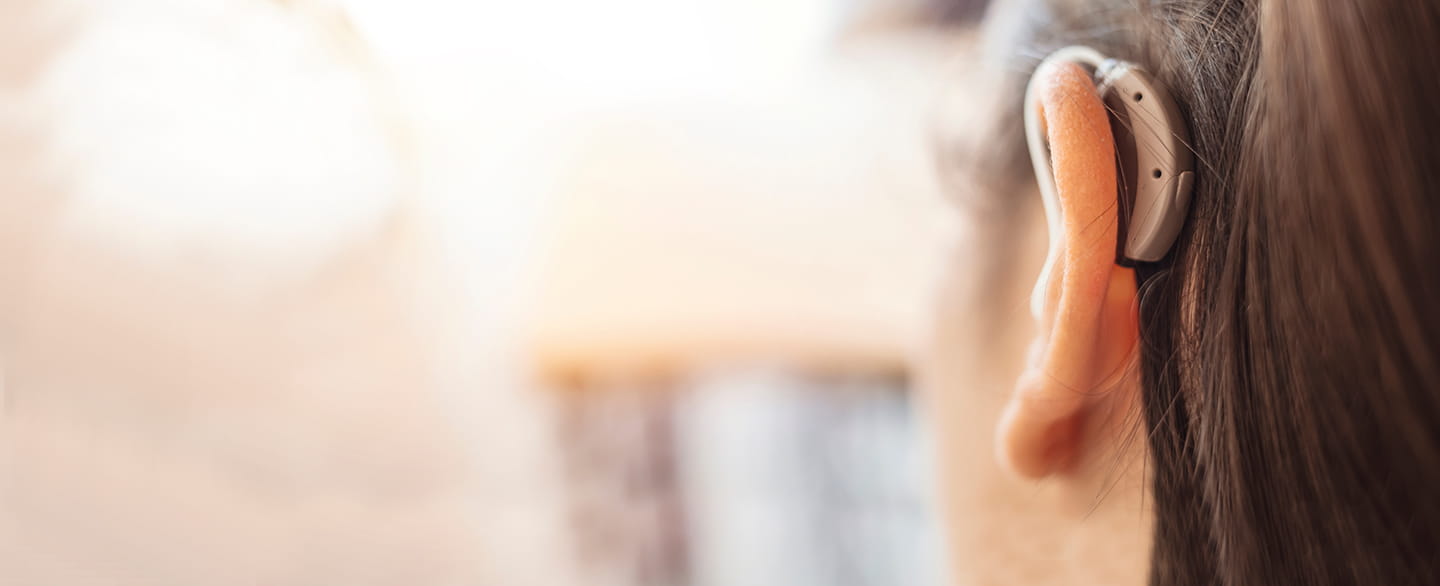Audiology

Audiology is the area of medicine concerned with hearing and balance and other related disorders. At The University of Kansas Health System in Kansas City, our audiologists help people of all ages with hearing loss and other audiological conditions.
We offer a variety of appointment types. Learn more or call 913-588-1227 to schedule now.
About audiology
Audiological conditions can be related to the central auditory nervous system (CANS) or to the ears (peripheral hearing system). Conditions related to the CANS are treated by our audiologists who work with our neurology care team. Conditions directly related to the ears are treated by our audiologists who work in otolaryngology – ear, nose and throat (ENT) care.
Neuroaudiology
Audiological disorders related to the CANS may include hearing loss, tinnitus, dizziness or auditory processing disorders – those that affect the auditory areas of the brain, cognitive impairment related to concussion, effects of aging, dementia, Alzheimer’s disease or other central conditions affecting the central auditory system. The neuroaudiology care team treats people of all ages, beginning with newborns.
Ear, nose and throat audiology
ENT audiology care encompasses diagnosis and medical, surgical or nonsurgical treatments of sensorineural, conductive or mixed hearing loss, as well as sudden or asymmetrical hearing loss. Our ENT audiology care team treats patients beginning at 6 months of age.
Common audiological conditions
Hearing loss is the most common audiological condition and has many causes. More than 50 million Americans have experienced some sort of hearing loss. Advances in technology mean people have more options to treat their hearing loss. There are 3 main types of hearing loss:
Tinnitus (TIN-uh-tus or tin-EYE-tus), or ringing in the ears, affects more than 40 million people in the US and may occur with or without noticeable hearing loss. The most common cause of tinnitus is exposure to loud noise, but there are also many medical causes, so it is important to have your tinnitus evaluated. There have been significant advances in tinnitus research, which means we have more treatment options available.
Audiology services
Services offered by the neuroaudiology care team include the evaluation of:
- Auditory hallucination
- Auditory processing disorder
- Dizziness
- Hearing and balance disorders related to concussion or mild traumatic brain injury
- Hearing for all ages, including hard-to-test individuals
- Newborn hearing, including auditory brainstem response
- Ototoxicity – hearing or balance problems caused by a medication – and other medication-related injuries
- Sound intolerance conditions such as hyperacusis, a disorder in loudness perception, and misophonia, a condition that triggers a strong reaction to common sounds
- Tinnitus – ringing in the ears
Services offered by the ENT audiology care team include the evaluation of:
- Age-related hearing loss
- Asymmetrical hearing loss
- Bone anchored implant candidacy
- Cochlear implant candidacy
- Dizziness
- Ear pain, discharge or infection
- Hearing, ages 6 months and up
- Mixed or conductive hearing loss
- Sudden hearing loss
The neuroaudiology and ENT audiology care teams have full vestibular testing capabilities to test balance and dizziness. These tests include:
- Auditory brainstem response (ABR): An ABR test checks how the hearing nerve responds to sound. It lets the audiologist know how the inner ear and the brain’s hearing pathways are working.
- Electrocochleography (ECochG): ECochG is a technique used to record electrical activity generated by the cochlea (inner ear) and the auditory nerve in response to sound.
- Rotary chair: Assesses the vestibulo-ocular reflex, the involuntary motion of your eyes that stabilizes vision when your head moves. You wear video goggles and a variety of slow rotational tests are performed with the motorized chair.
- Vestibular evoked myogenic potential testing (VEMP): This is used to measure the integrity of both branches of the vestibular nerve including vestibular end organs and central connections. The test uses surface electrodes and sound stimuli in the ear canal.
- Video head impulse testing (vHIT): This test measures the function of the 6 semicircular canals – the tiny, fluid-filled tubes, 3 in each ear, that help you keep your balance.
- Videonystagmography (VNG): Tests performed using video goggles to determine whether dizziness is caused by the inner ear. It measures eye movements while you move your head, eyes and body to different positions.
Audiology treatments
Our audiologists have experience you can trust to provide the right treatment for your audiological condition. Treatments for different types of hearing loss and other disorders are available from our neuroaudiology and ENT audiology specialists. Treatments include:
- Canalith repositioning maneuvers to treat benign paroxysmal positional vertigo
- Fitting and instruction for traditional and over-the-counter hearing aids for all ages
- Selection and fitting of custom hearing protection, musicians filtered ear plugs and swimming plugs
Neuroaudiology services include:
- Auditory training therapy, which helps people with hearing loss improve their listening skills and speech understanding
- Selection and fitting of assistive listening technologies and safety or alerting systems
- Sound therapy for tinnitus and hyperacusis
ENT audiology services include:
- Bone-anchored implant programming for all ages
- Cochlear implant programming for all ages
Why choose us for audiology
All our audiologists have earned a doctorate in audiology – so you can be assured of receiving the latest, leading-edge care, treatment and devices. We help people of all ages improve their quality of life and overcome the consequences of hearing loss, tinnitus and dizziness.
Our audiologists
Neuroaudiology audiologists
- Cole Campbell, AuD, CCC-A
- Mallory Miller, AuD, CCC-A
- Isabelle Moreland, AuD, CCC-A
- Anjelica Pearson, AuD, CCC-A, F-AAA
ENT audiologists
- Madison Braun, AuD, CCC-A
- Kristina Fletcher, AuD, CCC-A
- Anna Grashoff, AuD, CCC-A
- Rachel Koehler, AuD, CCC-A
- Lindsay Lad, AuD, CCC-A
- Kelly Malcolm, AuD, CCC-A
- Rachel Murphy, AuD, CCC-A
- Katie Plum, AuD, CCC-A




